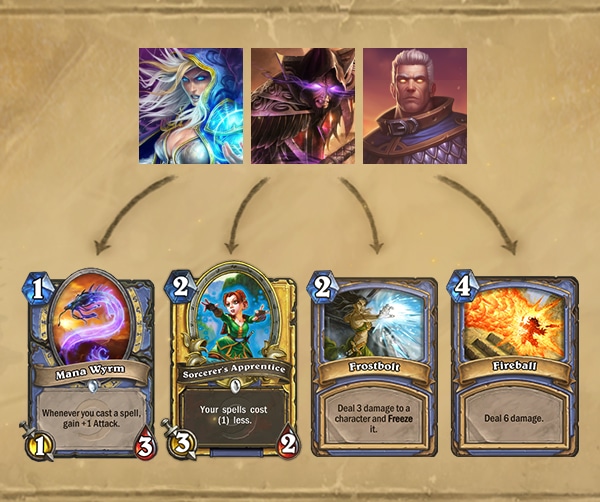Hearthstone - Heroes of Warcraft news » Classy Choices: Building a Tournament Deck with Apxvoid
Courtesy of the much-revered Mage master Jacob “Apxvoid” Coen, today we have a great glimpse into what it’s like to think through your class, its win conditions, and how to use them to develop and refine a tournament-worthy deck all your own.
Read on for Apxvoid’s guidance on building a competitive deck!

How do I identify the strengths and weaknesses of my favorite class?
“The first thing to look at in a class is their Hero Power,” Apxvoid says. “For example, Warlock decks often build around Life Tap by including cards affected by your hand size or running a lot of low-cost cards to overwhelm your opponent.”
“Some Hero Powers are less significant to the deck-building process, like Mage’s Fireblast, since it can work well with many decks and doesn’t really define your playstyle,” he adds.
Apxvoid also recommends looking at your class cards carefully. “Sometimes, one card can even shape how the rest of the deck ends up being built,” he says. “Tempo Mage has been strong for a long time because of Mage’s defining cards, like Mana Wyrm or Sorcercer’s Apprentice, and spells like Frostbolt and Fireball. I have been able to build Tempo Mage decks for over two years because these core cards can form a base structure for the deck.”

Apxvoid suggests looking at what your class lacks for weaknesses. “Rogue doesn’t have many defensive class cards, so their decks will often be built to be very offensive,” he says. “This can be seen as a weakness, because it means it’s harder to make a Rogue deck to win certain matchups. [For instance,] Rogue lacks defensive cards to survive Mage spells.”
What are the different types of win conditions I can build around?
“I love Hearthstone because there are so many different ways to win a game,” Apxvoid says. “Some decks will have one win condition, where others can have more depending on what matchup you’re playing. One of the reasons that I have been drawn to Tempo Mage for so long is because its win condition can rapidly change. Sometimes you will go from using your spells to clear the board to suddenly firing off every spell possible at your opponent.” He says other win conditions, like fatigue or combo decks, may have less flexibility.
“When building a deck, it’s important to have a solid idea [for] how you are going to win, and what decks you’re aiming to beat,” he adds. By way of example, Apxvoid helped Frank “Fr0zen” Zhang design his Control Mage deck for the 2017 Hearthstone Championship Tour (HCT) World Championship, targeting aggressive decks like Tempo Rogue and Aggro Druid.

How do I fill out a tournament deck? What variables—mana curve, tech cards, or otherwise—should I be considering?
Tournament deck design is all about understanding the field, or what other players will bring. “If you can predict what decks will be played, you can try to build yours to counter the field,” Apxvoid says. But, “It’s not as easy as it sounds—it’s difficult to find a lineup of three or four different decks that will work well against other lineups.”
In terms of tech cards, Apxvoid thinks about them in terms of which archetypes his opponents are likely to play. “Some lineups are meant to target control decks, so you might want to tech your deck to be greedy with cards like Doomsayers.” He goes on, saying, “You can’t tech for every matchup, so you have to carefully decide what is most important and will be used most often. It’s so important to predict the field, so you can choose tech cards that will be as useful as possible against the majority of lineups.”
How should I decide to replace a card to refine a deck as I’m testing it?
“When building and testing a deck, I’ll start with an initial idea that I think will be good,” Apxvoid says. “I usually won’t spend too much time building the first version of the deck—it’s more valuable to spend time testing it in game and getting a feel for it. I’ll just keep playing with it and try to figure out what works and what doesn’t.”
Apxvoid advises swapping in alternatives quickly to try them out. “If I come up with a deck list that I like and want to take to an upcoming tournament, then I’ll contact other tournament players to test the deck in friendly games,” he says. “This also allows me to really focus on matchups of my choosing.”
When is my deck “done”?
“In my opinion a deck is almost never done,” Apxvoid says. “For a deck to be completely done, all 30 cards would have to be core to the win condition, with no worthy alternatives.” Given that the metagame constantly adapts to what people are playing, a deck should constantly be in a state of revision. He says, in an observation that also applies to tournaments, “I find myself changing my Mage decks all the time to adapt to meta shifts.”

What an awesome guide! You can find Apxvoid on Twitter, or check out his next-level Mage play personally on Twitch.
Do you have any advice of your own for players looking to concoct a competitive creation? Lay it on us in the comments!















 Update comments
Update comments